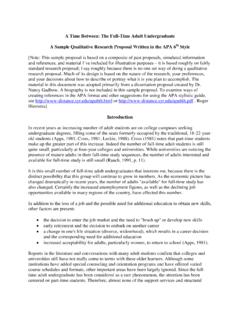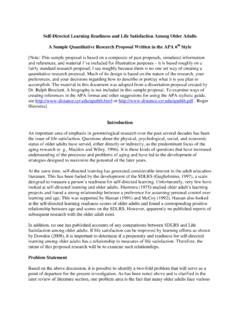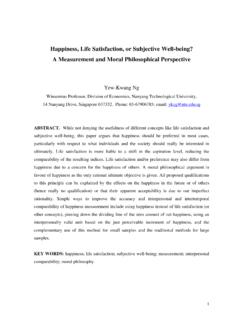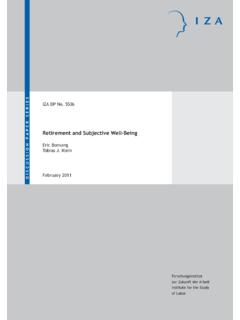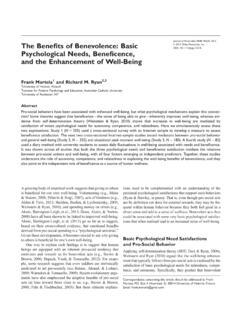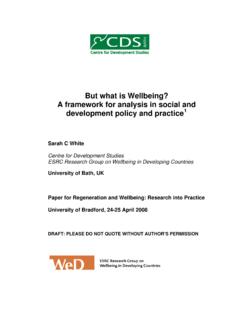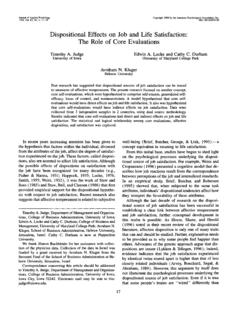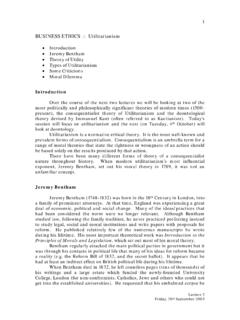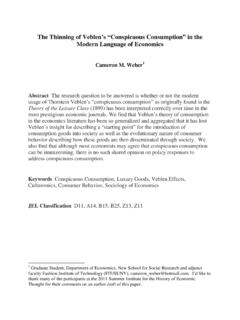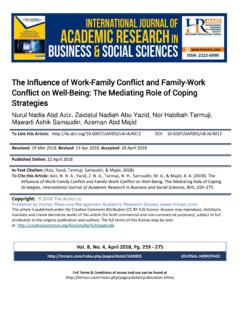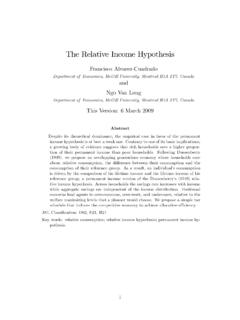Transcription of Quantitative Research Proposal Sample - roghiemstra.com
1 Self-Directed Learning Readiness and life satisfaction Among Older Adults A Sample Quantitative Research Proposal Written in the APA 6th Style [Note: This Sample Proposal is based on a composite of past proposals, simulated information and references, and material I ve included for illustration purposes it is based roughly on a fairly standard Research Proposal ; I say roughly because there is no one set way of creating a Quantitative Research Proposal . Much of its design is based on the nature of the Research , your preferences, and your decisions regarding how to describe or portray what it is you plan to accomplish. The material in this document was adopted from a dissertation Proposal created by Dr.]
2 Ralph Brockett. A biography is not included in this Sample Proposal . To examine ways of creating references in the APA format and other suggestions for using the APA stylistic guide, see or . Roger Hiemstra] Introduction An important area of emphasis in gerontological Research over the past several decades has been the issue of life satisfaction . Questions about the physical, psychological, social, and economic status of older adults have served, either directly or indirectly, as the predominant focus of the aging Research (e. g., Maddox and Wiley, 1996). It is these kinds of questions that have increased understanding of the processes and problems of aging and have led to the development of strategies designed to maximize the potential of the later years.
3 At the same time, self-directed learning has generated considerable interest in the adult education literature. This has been fueled by the development of the SDLRS (Guglielmino, 1997), a scale designed to measure a person s readiness for self-directed learning. Unfortunately, very few have looked at self-directed learning and older adults. Hiemstra (1975) studied older adult s learning projects and found a strong relationship between a preference for assuming personal control over learning and age. This was supported by Hassan (1991) and McCoy (1992). Hassan also looked at the self-directed learning readiness scores of older adults and found a corresponding positive relationship between age and scores on the SDLRS.
4 However, apparently no published reports of subsequent Research with the older adult exist. In addition, no one has published accounts of any comparisons between SDLRS and life satisfaction among older adults. If life satisfaction can be improved by learning efforts as shown by Dowden (2008), it is important to determine if a propensity and readiness for self-directed learning among older adults has a relationship to measures of life satisfaction . Therefore, the intent of this proposed Research will be to examine such relationships. Problem Statement Based on the above discussion, it is possible to identify a two-fold problem that will serve as a point of departure for the present investigation.
5 As has been noted above and is clarified in the later review of literature section, one problem area is the fact that many older adults face various 2 hurdles that can impact their overall state of well-being. Some adults are able to cross these hurdles through self-learning efforts, while others find themselves less well equipped to cope with such concerns. The second problem area involves better understanding why some people turn to learning for meeting personal needs, while others do not. In essence, life satisfaction varies considerable among older adults, as does personal propensity to undertake learning efforts. It is these variances that lie at the heart of the problem areas proposed for this study.
6 If a link can be established between life satisfaction and an attitude conducive to self-directedness in learning, then it might be possible to look toward self-directed learning as a strategy for promoting a higher quality of life among persons in their later years. Purpose The purpose of this study, then, is to explore ways in which older adults perceptions as self-directed learners compare with the degree of satisfaction that they ascribe to their lives. Specifically, the study will focus on two primary objectives: 1. To determine the relationship between life satisfaction and personal readiness for self-directed learning.
7 2. To determine the extent to which components of life satisfaction combine with selected demographic variables to predict a person s level of self-directed readiness. In addition, because so little is known about self-directed learning among older adults, a third objective will complete the Research effort: 3. To examine various methodological and substantive considerations in studying self-directed learning. Hypotheses Based on a review of literature as noted later in this Proposal , two major hypothesis areas will guide the analysis of data. First, it is hypothesized that perceptions of life satisfaction will be related to perceptions of self-directed learning readiness among a Sample of older adults.
8 Those persons who report a high degree of life satisfaction will tend to have perceptions of higher self-directed readiness while low satisfaction will be related to low self-directed readiness. In essence, this means that it will be possible to predict an individual s level of self-directed readiness by knowing their score on overall life satisfaction plus some of the factors sometimes identified as barriers to participation in adult education among older adults, such as age and gender. Finally, it is hypothesized that subjects from a community Sample will tend to demonstrate higher self-directed readiness and life satisfaction than those residing in an institutionalized setting.
9 Definition of Key Terms life satisfaction a self reported assessment of one s overall psychosocial well-being. It is a combination of (a) personality factors such as mood and self-concept, (b) more socially-related 3 factors such as the nature of one s social interactions, (c) perceived health, and (d) financial security. Older Adult for the proposed study, older adult is defined as any person who is at least 65 years of age. Self-Directed Learning a process in which individuals take the initiative, with or without the help of others, in diagnosing their learning needs, formulating learning goals, identifying human and material resources for learning, choosing and implementing appropriate learning strategies, and evaluating learning outcomes.
10 Self-Directed Learning Readiness the degree to which one perceives oneself to possess the attitudes and skills needed to be an effective self-directed learner. It is measured in the proposed study through the Self-Directed Learning Readiness Scale (SDLRS), developed by Guglielmino (1997). Review of Literature Before considering this body of literature, it is important to point out that Research on qualify of life has not fallen within the exclusive domain of gerontologists. Quality of life is an issue that is relevant to persons of all ages and has been widely studied as such. Cantrill (1965), for instance, studied quality of life among persons in more than a dozen nations at different stages of development.
